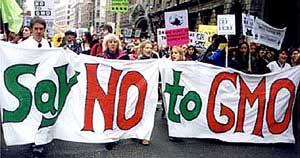Biotech Request Alarms Food Industry
By Philip Brasher
Des Moines Register Washington Bureau
August 6, 2004
The Grocery Manufacturers of America is concerned about ProdiGene's plans to grow biotech corn in Texas.
Washington, D.C. - A biotech company is seeking federal approval to begin regular production of pharmaceutical corn crops, a move that has alarmed the U.S. food industry.
The Texas-based company, ProdiGene Inc., gave the biotech industry a black mark two years ago when it was caught mismanaging field trials of genetically modified crops in Iowa and Nebraska.
ProdiGene, which is commercializing two medical products made from bioengineered corn, has asked the U.S. Agriculture Department to allow cultivation of the crops in Frio County, Texas, a thinly populated area southwest of San Antonio.
The Grocery Manufacturers of America, which represents such brands as Kellogg, General Mills, Kraft and Gerber, opposes the application. In a letter July 28 to the USDA, the trade group said the government provides inadequate oversight of crops engineered for pharmaceutical and industrial purposes.
"We have long memories of the potential impact this can have on our companies," said Stephanie Childs, a group spokeswoman.
Some food companies were required to do nationwide recalls three years ago, after a variety of biotech feed corn not approved for human consumption, StarLink, was found mixed with supplies of food-grade grain.
ProdiGene officials did not return calls seeking comment.
ProdiGene was forced to pay the government about $3 million in penalties and cleanup costs for failing to prevent its pharmaceutical corn plants from getting mixed with crops intended for food or animal feed.
ProdiGene's problems, coupled with tighter planting rules imposed by the USDA in 2003, dealt a sharp setback to Iowa's hopes of developing bio-farming.
A taxpayer-financed Iowa investment fund bought into ProdiGene in 2001. Last year, a subsidiary of Iowa-based Stine Seed Co. purchased a majority ownership in ProdiGene.
However, the food companies' opposition to ProdiGene's Texas plans highlights the industry's concern about biotech crops.
There were no field trials of pharmaceutical crops in the state last year, and this year there is just one, which involves barley, not corn.
The Grocery Manufacturers of America said the Food and Drug Administration should evaluate the safety of pharmaceutical or industrial crops before they are approved for cultivation.
"Right now, as it stands, federal regulations say that if any of these plant-made pharmaceuticals make it into the food supply, we have an adulterated product," Childs said. "It's our brands that get damaged. We're not ready to take that risk for a product that we're not developing."
The USDA took the unusual step of writing environmental assessments for the ProdiGene crops because the company plans repeated plantings during the next several years.
USDA analysts concluded there would be little health or environmental risk from the corn crops, in part because little other corn is grown in Frio County. Although the location was not disclosed, the ProdiGene crops will be at least a mile away from any other corn with which they could cross-pollinate, the studies said.
The corn would be used to manufacture trypsin, used for insulin, vaccines and other products, and aprotinin, which also has a number of medical applications. Both products are now derived from cattle tissue.
The company will inspect the crops weekly at first and then daily during pollination, the USDA said. Several vegetable crops that will grow nearby, including onions and cabbage, will be picked by hand to ensure that no corn seeds are mixed with them.
Two trade groups representing companies that process and ship grain - the National Grain and Feed Association and the North American Export Grain Association - told the USDA they were pleased the Texas farm is "far removed from major corn producing areas."
But Gregory Jaffe, who follows the biotech industry for the Center for Science in the Public Interest, a consumer advocacy group, said the USDA released insufficient information about the site to judge whether the crop was a threat.
He also shares the food industry's concern about ProdiGene's plans.
"We should not engineer any food crop and allow it to be grown on a commercial scale without FDA determining that that crop is safe if it gets into the food supply," he said.
The USDA is taking public comment on the environmental assessments through Tuesday.
In 2003, the USDA increased isolation and inspection requirements for pharmaceutical crops to avoid a repeat of the ProdiGene incidents.
"We expected it would mean less pharmaceutical corn is grown in the Corn Belt," said Cindy Smith, who oversees biotech regulation for the USDA. "We leave it up to researchers to decide where they are going to grow."
top of page

